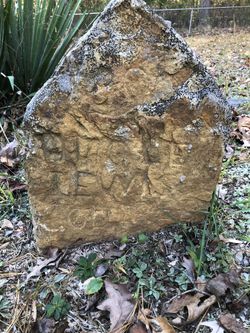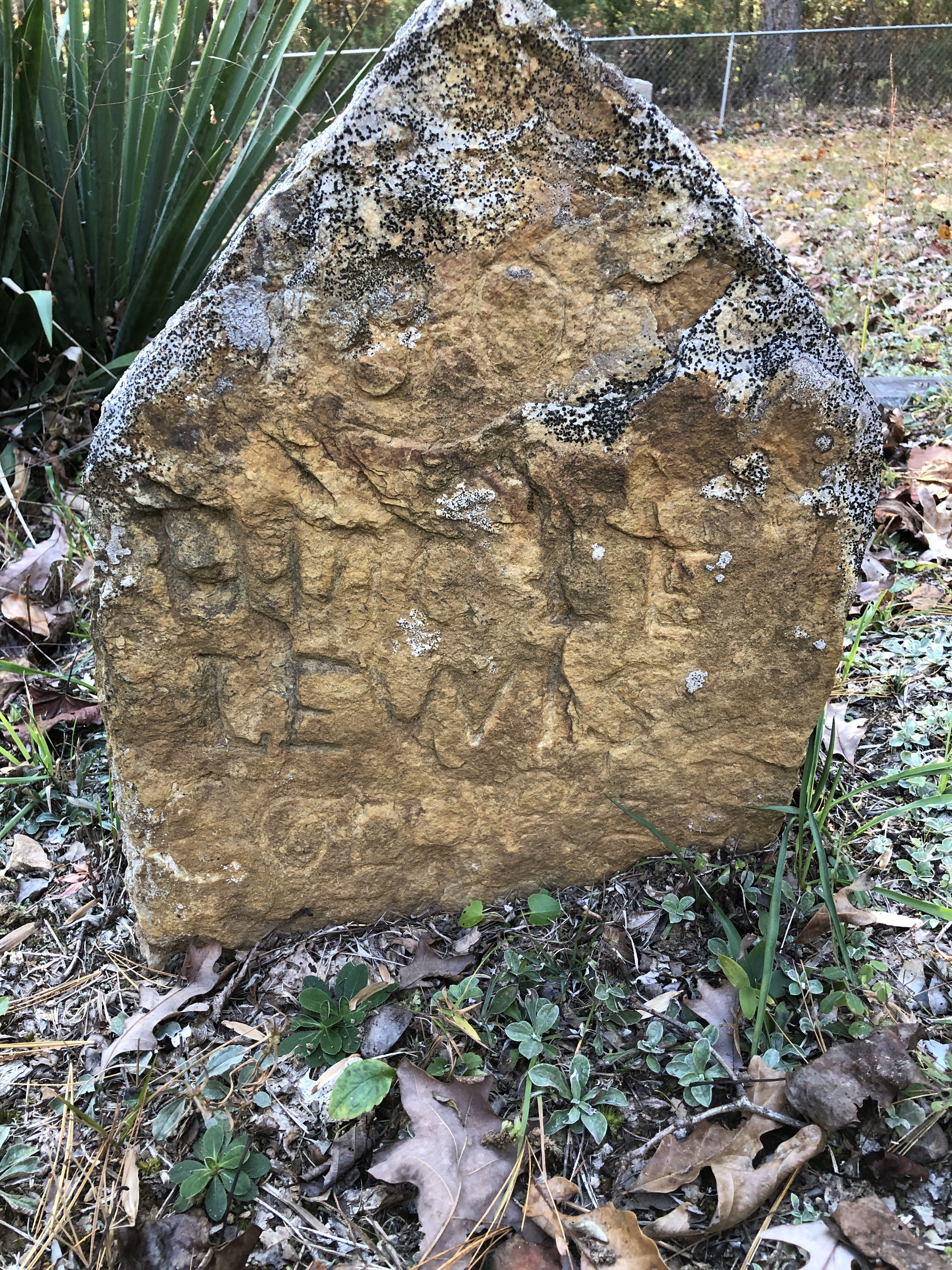The Reverend Joseph Pinnell was an abolishonist and did not believe in slavery. He was an Elder in the Methodist Espiscopal Church (later to evolve into the United Methodist Church), a former circuit rider and was ordained by Francis Asbury and Dr. Thomas Coke in 1795. Reverend Pinnell's church was the only church in the area to allow blacks and whites to sit side-by-side in a congregation.
In his memors, the Reverend Pinnell once wrote of a cruel scene where a lynch-mob entered his church during his sermon, removed a black man who they accused of committing an offense and hanged him on the branch of a tree outside the church. He stated that he could not understand the cruel nature of these people.
Lewis Alexander was an elderly slave owned by a man by the last name of Price. Lewis had a wife and several children who all worked on Mr. Price's farm. Lewis was getting elderly and could no longer perform to Mr. Price's requirements so Mr. Price decided to sell Lewis to a farmer in Carolinas. This devastated Lewis because he knew that he would never see his wife and children again. For days, he pondered what could be done.
One of the only white men that he knew that he could confide in and could trust was Reverend Pinnell. It was not too soon before Lewis found himself asking for the Reverend's advice. He was in tears as he told his ordeal to the Reverened. He did not want to leave the area and had no other place to go as he was the property of Mr. Price.
This saddened Reverend Pinnell who contemplated his own alternatives towards helping Lewis, however a solution was made. As a staunch believer in the abolition of slavery, Reverend Pinnell made a choice that he never thought he would make. It was the only solution and the only way that Lewis could spend the rest of his life with his family. He would buy Lewis from Mr. Price. Reverend Pinnell promised Lewis that he would not be traded to any Carolina plantation and that he could live on his farm.
Uncle Lewis would be free to come and go and to visit his family on Mr. Price's farm whenever he so chose. He could help out on the Pinnell Farm doing small chores around the home. The purchase was to occur within just a few weeks. This was 1849 and in that day and age, Lewis could not even pray for a better setup in that time in that nvironment.
Before Lewis could be purchased, Reverend Pinnell passed away at the age of 62. Once again, Lewis was devastated and did not know where to turn. He prepared for the worst and spent those final days with his family on Mr. Price's farm.
The day of the slave trade came about and all the buyers and sellers appeared. When Lewis' turn came to be sold, lo and behold, appearing out of the crowd was a woman...the late Reverend's widow came to purchase Lewis as one of the Reverend's dying wishes!
Lewis helped out on Mrs. Pinnell's farm and would take care of Mrs. Pinnell's new granddaughter, Mary Fletcher Lynch. Mrs, Pinnell's only surviving child had married John Brownlee Lynch and they lived nearby. Soon, Lewis Alexander became "Uncle Lewis".
He was just like an uncle to the Lynch children and he was the happiest he had ever been in his life. He visited his wife on a regular basis and was able to witness his own children mature through the years.
After the Civil War, Mrs. Pinnell would often remind Uncle Lewis that he was free to go anywhere he wanted...to leave or stay. At his age, Uncle Lewis really had no place else that he would rather be as his children were nearby and everyone that ever cared for him as a person was already around him.
Uncle Lewis died a few years later. His body was not buried in some lone slave plot, but was laid to rest amongst his white family in the Pinnell Family Cemetery in Potts Creek, VA where the Reverend himself was buried.
Well...that is about it concerning Uncle Lewis! That story came from my Great Aunt, Leila Blanche Bess who used to be a WPA Project writer that passed away in 1959.
The Reverend Joseph Pinnell was an abolishonist and did not believe in slavery. He was an Elder in the Methodist Espiscopal Church (later to evolve into the United Methodist Church), a former circuit rider and was ordained by Francis Asbury and Dr. Thomas Coke in 1795. Reverend Pinnell's church was the only church in the area to allow blacks and whites to sit side-by-side in a congregation.
In his memors, the Reverend Pinnell once wrote of a cruel scene where a lynch-mob entered his church during his sermon, removed a black man who they accused of committing an offense and hanged him on the branch of a tree outside the church. He stated that he could not understand the cruel nature of these people.
Lewis Alexander was an elderly slave owned by a man by the last name of Price. Lewis had a wife and several children who all worked on Mr. Price's farm. Lewis was getting elderly and could no longer perform to Mr. Price's requirements so Mr. Price decided to sell Lewis to a farmer in Carolinas. This devastated Lewis because he knew that he would never see his wife and children again. For days, he pondered what could be done.
One of the only white men that he knew that he could confide in and could trust was Reverend Pinnell. It was not too soon before Lewis found himself asking for the Reverend's advice. He was in tears as he told his ordeal to the Reverened. He did not want to leave the area and had no other place to go as he was the property of Mr. Price.
This saddened Reverend Pinnell who contemplated his own alternatives towards helping Lewis, however a solution was made. As a staunch believer in the abolition of slavery, Reverend Pinnell made a choice that he never thought he would make. It was the only solution and the only way that Lewis could spend the rest of his life with his family. He would buy Lewis from Mr. Price. Reverend Pinnell promised Lewis that he would not be traded to any Carolina plantation and that he could live on his farm.
Uncle Lewis would be free to come and go and to visit his family on Mr. Price's farm whenever he so chose. He could help out on the Pinnell Farm doing small chores around the home. The purchase was to occur within just a few weeks. This was 1849 and in that day and age, Lewis could not even pray for a better setup in that time in that nvironment.
Before Lewis could be purchased, Reverend Pinnell passed away at the age of 62. Once again, Lewis was devastated and did not know where to turn. He prepared for the worst and spent those final days with his family on Mr. Price's farm.
The day of the slave trade came about and all the buyers and sellers appeared. When Lewis' turn came to be sold, lo and behold, appearing out of the crowd was a woman...the late Reverend's widow came to purchase Lewis as one of the Reverend's dying wishes!
Lewis helped out on Mrs. Pinnell's farm and would take care of Mrs. Pinnell's new granddaughter, Mary Fletcher Lynch. Mrs, Pinnell's only surviving child had married John Brownlee Lynch and they lived nearby. Soon, Lewis Alexander became "Uncle Lewis".
He was just like an uncle to the Lynch children and he was the happiest he had ever been in his life. He visited his wife on a regular basis and was able to witness his own children mature through the years.
After the Civil War, Mrs. Pinnell would often remind Uncle Lewis that he was free to go anywhere he wanted...to leave or stay. At his age, Uncle Lewis really had no place else that he would rather be as his children were nearby and everyone that ever cared for him as a person was already around him.
Uncle Lewis died a few years later. His body was not buried in some lone slave plot, but was laid to rest amongst his white family in the Pinnell Family Cemetery in Potts Creek, VA where the Reverend himself was buried.
Well...that is about it concerning Uncle Lewis! That story came from my Great Aunt, Leila Blanche Bess who used to be a WPA Project writer that passed away in 1959.
Advertisement
Explore more
Sponsored by Ancestry
Advertisement


